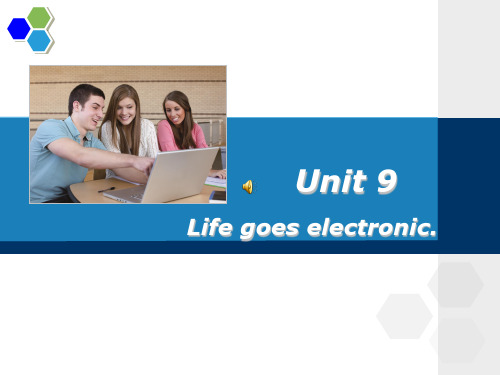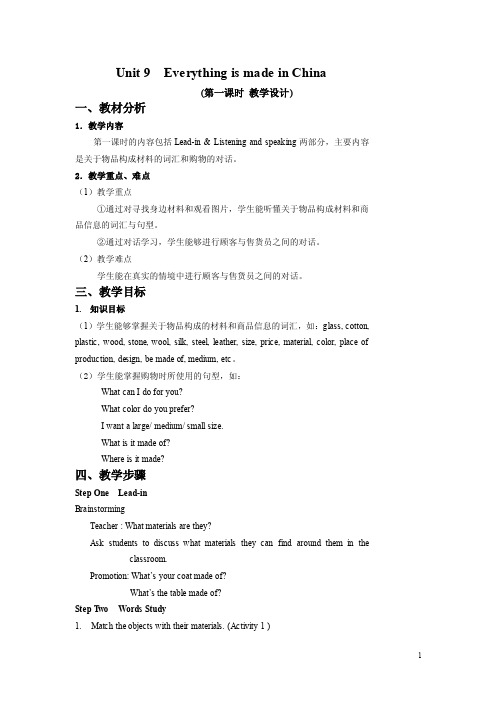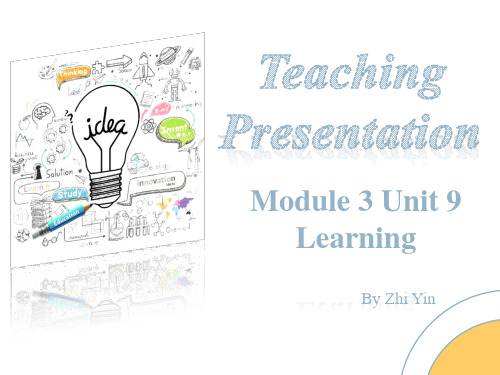Unit9(3) speaking
中职英语基础模块Unit9

莉萨:我怎样才能在网上找到想要的:输入关键词,然后点击搜索按钮。 莉萨:就这么简单? 比尔:当然了,这就是电子化生活。
Listening and Speaking
5 Order and act. 讨论在网上下载歌曲的步骤,并表演对话。
马克:你好,苏珊,你上网通常都做些什么? 苏珊:我经常看新闻和查收电子邮件。 马克:你还喜欢做别的什么吗? 苏珊:我还喜欢看微博和写微博。 马克:你是说“微博”? 苏珊:是的,没错。
Listening and Speaking
3 Look and discuss. 看图,讨论你通常上网做什么。
S1: What do you usually do online? S2: I often chat with my friends. S1: What else do you like to do? S2: I also like to do shopping and watch films. S1: That’s cool!
Marc: What else do you like to do? Susan: I also like to read and write microblogs.
Marc: You mean Weibo? Susan: Yeah, that’s right.
参考译文
Weibo,微博,是一种比较流行的网络社交平台。 其特点是内容短小精悍,通常限制在140字以内。
Warming up
fax machine
传真机
Warming up
printesktop
台式电脑
Warming up
photocopier
复印机
Warming up
旅游情境英语unit 9

Unit 9 Bid Farewell to the Guest
Basic Skill
Task One Checking out at a Hotel Situation: Sun Hui, a local English tour guide of the travel agency, is coming to the front desk in the hotel to check out for the tour group. And Mr. Taylor and Mrs. Johnson are two guests from this tour group. Task Two Delivering a Farewell Speech Situation: Sun Hui, a local English tour guide of the travel agency, is on the way to the airport. He is delivering a farewell speech to the tour group on the coach. Then he will collect the feedback forms which he asked the guests to fill out yesterday.
Unit 9 Bid Farewell to the Guest
7. Before the tour group leave the hotel, unless there are _s_p_e_c_ia_l___ reasons, the local guide should check out before noon 12:00
complicated security inadequacy article
中职英语基础模块2(新课标版)教案:Unit9EverythingismadeinChina

Unit 9 Everything is made in China(第一课时教学设计)一、教材分析1.教学内容第一课时的内容包括Lead-in & Listening and speaking两部分,主要内容是关于物品构成材料的词汇和购物的对话。
2.教学重点、难点(1)教学重点①通过对寻找身边材料和观看图片,学生能听懂关于物品构成材料和商品信息的词汇与句型。
②通过对话学习,学生能够进行顾客与售货员之间的对话。
(2)教学难点学生能在真实的情境中进行顾客与售货员之间的对话。
三、教学目标1.知识目标(1)学生能够掌握关于物品构成的材料和商品信息的词汇,如:glass, cotton, plastic, wood, stone, wool, silk, steel, leather, size, price, material, color, place of production, design, be made of, medium, etc。
(2)学生能掌握购物时所使用的句型,如:What can I do for you?What color do you prefer?I want a large/ medium/ small size.What is it made of?Where is it made?四、教学步骤Step One Lead-inBrainstormingTeacher : What materials are they?Ask students to discuss what materials they can find around them in the classroom.Promotion: What’s your coat made of?What’s the table made of?Step T wo Words Study1. Match the objects with their materials. (Activity 1 )Teacher : Show the words and related pictures of the objects on the screen.Students: Match the objects with their materials.Step Three Listening1. Pre-listeningTeacher: Ask several students about their clothes. The dialogue are as follows:T: What color is your coat?S: It’s ...T: What’s it made of?S: It’s made of ....T: What size is it?S: It’s size L.2. While-listening(1)Listen and answer the questions. (Activity3)(2)Listen again and tick the things they are talking about. (Activity 4)3. Post-listening ( class work and pair work )Step Four Speaking1. Read aloud after the tape and pay attention to the underlined sentences. (Activity 6)Ask students to read the underlined sentences and memorize.What is it made of?It’s made of silk.Where is it made ?I t’s made in China.2. Role play the dialogue between a customer and a shop assistant with the information given. (Activity 7)(1)Teacher makes short dialogues with several students first.Step Five DiscussionTalk about the things you bought recently in pairs.Sample: A: I bought a new scarf last weekend.B: Where is it made?Step Six Homework1. Remember and search more materials about the objects around you.2. Make up a dialogue of asking and giving information about goods.五、板书设计Unit 9 Everything is made in China(第二课时教学设计)一、教材分析1.教学内容本单元阅读活动的目的是训练学生理解描述某人一天购物经历的短文,让学生能在一般的生活、工作语境中使用正确的叙事方式,并能完成相关语言(笔头)输出任务,同时读写活动也为学生完成单元任务作相关的语言准备。
Unit 9 Learning 大单元说课课件高中英语北师大版(2019)必修第三册

Step 1
Step 2 Reading Post-reading Step 3
Step 4
Step 5
Activity 8
Which of these suggestions do you think is the most useful for you?
Intention
To practice critical thinking
What attitude should be adopted to deal with learning and life under different cultural backgrounds so as to improve students' logical and critical thinking
Theme: Human & Self
What
Topic: Learning
Aim: To form correct outlook on
Why
learning & strive to be an active lifelong learner
Value Orientation: Willing to learn, good at learning, lifelong learning
Method
Activity-based Teaching
Method
Individual Study
Communicative Teaching Method
Cooperative Study
Audio-visual Teaching Method
P art
大观念 小观念 单元目标 语篇 学生活动 学生评价
Unit-9-Teaching-Speaking 英语教学法

Characteristics of successful tasks:
1.Maximum foreign talk
In successful speaking tasks, the students talk a lot in the foreign language. One common problem in speaking activities is that students often produce one or two simple utterances in the foreign language and spend the rest of the time chatting in their native language. Another common problem in speaking activities is that the teacher talks too much of the time, thus taking away valuable practice time from the students.
9.2 Designing speaking tasks
新北师大版高中英语选择性必修三Unit9-Lesson3EpidemicsExplained说课课件

the basic introduction of human brain
explain epidemics,including 2or:siguinm,tmypaer,eyxaomf tphlees of epidemics,process,possiblepcraeuvsieosuasndtwsoolulteiosnssons
4.Report on the issue of epidemics on school English forum
03
Learners
Analysis of Learners
What they have
1 cooperation and willingness to learn 2 a certain amount of vocabulary to describe human biology 3 basic language skills
Experiments Traditional Chinese
Medicine DNA Detectives
Content Importance
introduce cloned animals-Dolly,ZhongZhong,Hua Hua and disagreement about clone
What they lack
1 active exploration 2 a clear idea about context 3 how to express their own ideas vividly and logically
04
4.many learning tasks (eight exercises)
Unit9 Time to Celebrate! Listening and Speaking

Unit9 Time to Celebrate! Listening and Speaking【学习要求】1.通过本课的学习,掌握中西方重大节日的英语表达及各节日的日期。
2.更多的了解在一些中国传统节日中进行的活动。
3.提高在听力训练中捕捉相关信息的能力。
4.能在听的过程中了解如何作出邀请,接受或拒绝邀请。
5.提高用英文表达作出邀请,礼貌接受或拒绝邀请的口语能力。
6.通过本课学习,掌握重点词汇,句型。
【学习重点、难点】1.熟悉并掌握以下词汇:festival, celebrate, decorate, refuse, relax, come over, think about,have a picnic, be tired of , family gathering, have two days off, a couple of.2.能听懂并用英语写出国内外重大节日。
3.能大胆运用常见的表示邀请,接受或拒绝的句型与他人进行简单交流。
【学时安排】一学时。
【学习过程】一、课前准备(一)学法指导1. 了解一些中西方重大节日的基本表达及日期。
2. 谈论一些中国传统节日的活动内容。
(二)知识准备1. 通过查阅日历来了解今年几个中国传统节日的具体日期。
2. 向父母或同学询问,或通过网络搜索等方式尽可能多地汇总各种重大节日的英语表达。
3. 预习一些单词和词组:festival, celebrate, relax, Dragon Boat Festival, Lantern Festival,comeover, have a picnic,试读发音并了解中文意思。
(三)尝试练习1. Can you list some traditional festivals ?二、课堂学习(一)学法指导1. 根据图片及图表了解一些节日的日期,小组讨论一些传统节日的活动。
2. 根据听力内容捕捉作出邀请,接受或拒绝邀请的信息。
3. 据听力理解的程度,要求回放次数。
学术英语(社科)Unit 9讲解

Unit 9
Globalization in Political Science
Lead-in
In Unit 5, globalization is mentioned as the recent trend in the development of culture and the term is defined from a sociologist’s point of view. Globalization is also the buzzword in political science nowadays.
学术英语 社科
Academic English for Social Sciences
9
Globalization in Political Science
In Unit 5, globalization is mentioned as a recent trend in the development of culture and is defined from a sociologist’s point of view. Globalization is also the buzzword in political science nowadays. In this unit we are going to see how political scientists define globalization, how their perspective is different from sociologists’, and more importantly, what the difference implies about the way we acquire knowledge.
- 1、下载文档前请自行甄别文档内容的完整性,平台不提供额外的编辑、内容补充、找答案等附加服务。
- 2、"仅部分预览"的文档,不可在线预览部分如存在完整性等问题,可反馈申请退款(可完整预览的文档不适用该条件!)。
- 3、如文档侵犯您的权益,请联系客服反馈,我们会尽快为您处理(人工客服工作时间:9:00-18:30)。
do
homework
做 家庭作业 Excuse me, Can we do homework in the library? Yes, we can.
Excuse me. 对不起,打扰
了(用于引起别人的不方便,而不是做错
Can we shout in the library?
No, we can’t.
eat
吃
Excuse me, can I eat in the library?
No, you can’t.
look for things on the Internet Excuse me, can we look for things on the Internet in the library?
Unit 9
In the library
First, warming-up talk 来
练练英语吧
They can play football .
She can
fly a kite.
We cannot smoke .
Can you use these patterns to talk? 你会用这些句型了吗? 1.…can…
cannot 4. She is short. She_______ (isn’t/ cannot) open the door.
5.Nick: -Can you play computer games now? Mum: -No, you______ (can’t / don’t) can ’t
Homework
Try to improve yourselves.(提高自己)
Can 1._________(can/ Do) we sit here?
must 2.You__________ (must/ are) do your homework first?
can’t 3. We _______( can’t / aren’t) feed the birds in the zoo.
Can you remember the rules in the library?
We can
do homework in the library.
look for things on the Internet in the library.
shout in the library.
We can’t
1.助动词,构成疑问句及否定 句,无词义(Unit3)
do
2. 实义动词 9)
做、干(Unit
1.What do you do? 2.What does your father do? 3.I don’t do my homework.
Boys and girls,
Come on!
shout
大喊
On Page 112/ 113
Thank you!
Can -______ I play computer games first? can’ -No, you_____. You_____ play can them later(以后). t
play computer games
玩/打 电脑 游戏
play
on the computer
玩
在电脑上
Today, we will study ….
Can you use some words to describe the library?你能用一些形容词来
描绘一下图书馆吗?
clean \ big \ quiet \ tidy …
Please think…
What can we do in the library?
2…can’t… 3.let’s…
4.Don’t…, please 5…, please.
Free talk.自由表达。
动词短语
1.play basketball after class e a mobile in our school
3.watch TV on the plane 4.fly kites in the zoo
Look at the picture and make a dialog.看图编对话
run
-Excuse me , can we run in the library? -No, you can’t.
Grammar
We have learned…学会了…
I
能被其它的 任何人称替换。
I can…
2. Can he eat in the library? No, he can’t.
Read the dialogue -Excuse me, can I bring my bag here? -Yes, you can. -Can I eat here? -No, you can’t. Look at the sign.
Yes, we can.
write in the books
Excuse me, can I write in the books? No, you can’t.
take the newspaper
home
Excuse me, can I take the newspaper home? No, you can’t.
了事)。 对不起(用于做错了 事)。 Excuse me 1.___________ ,can I use your mobile? Excuse me 2.___________ ,May I ask you a question?
sorry
Sorry 3._______, I’m late again.
over there 在那边(指较远的地方)
on 穿上(衣服)
put
up 挂起(东西) down
放下(东西)
如果衣服,东西是代词指代的话, 代词放 在短语的中间。 put it on / put them up / put it down
Can -______ I eat some bread, Mum? can -Yes, you_____.
为什么这里要
用
e?
-______ I do my Can homework now? -Yes, you________. can
做家庭作业
do homework
do one’s homework
某人的(形容词性物主代词)
方法:物 主代词与 前面的主 语保持一 致
I can do ______ homework. He must my do______ homework. his your You can do_______ homework. Nick can do ________ homework. his
write in the books of the library. take the newspaper home.
home 前不带to
Listen to the dialogue and then understand.听对话并
理解。
1. Can he bring his bag to the library? Yes, he can.
play computer
first 首先,最初,第一(表示顺序
的词)
one
数量
One Class______
first
顺序
first the ________ class
later
迟的
adv.以后,后来,adj. 更
late
later
late 1.Don’t be _____ again.
later 2.You can play football_____.
我 能…
I can’t…
我 不能…
Can I…?我能…吗? Yes, I can. No, I can’t.
Have a try ,please. Fill in the blanks.试着填空。
1.- Where can I put my football, mum? can - You _______ put it over there.
